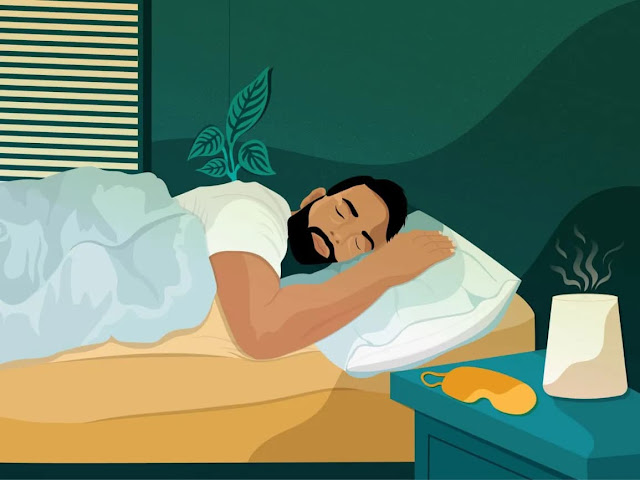
Some of us may have trouble
sleeping some nights, but for others, sleeplessness is a constant companion.
Those who have experienced sleep anxiety know the feeling of dread as they
watch the clock, worried that they won't be able to get to sleep and will thus
feel exhausted the next day.
Anxiety and insomnia are
linked in a variety of ways, as it turns out. Anxiety prevents 50% of people
with sleep deprivation from falling asleep at night. Anxiety can make it
difficult to fall asleep and stay asleep, so knowing how it works is crucial.
The impacts of sleep deprivation due to anxiety are discussed, along with
methods for reducing anxiety.
Anxious and Can't Sleep
A form of performance
anxiety, sleep anxiety is characterized by a recurrent pattern of apprehensive,
unsettling, and worrisome thoughts right before bedtime. While you have much to
keep your mind busy during the day, it may get restless at night and resort to
worrying thoughts and feelings if it has nothing else to do.
Stress and insomnia are two
symptoms of anxiety that can feed into each other. If you suffer from night
anxiety on a regular basis, it might be difficult to determine whether or not
your sleep problems are a direct result of your anxiety. Recent studies have
shown there is a correlation between difficulty sleeping and feeling anxious.
Anxiety can make it hard to fall asleep and stay asleep, but not getting enough
sleep can have the opposite effect. Being sleepless can make you avoid bed
altogether and make the morning after seem even worse.
Symptoms of Sleep Anxiety
Nighttime anxiety manifests
in many forms since its effects vary from person to person. Anxiety right
before bed is the same as anxiety during the day. The difference is that you
may notice your anxiety more at night because there are fewer other things
going on at the same time. Even though the causes of sleep anxiety vary from
person to person, some of the most prevalent symptoms include:
1. Sleeplessness
2.
Focusing difficult
3.
Restlessness
4.
Gastric issues
5.
Nightmares
Panic episodes are another
sign that sleep anxiety is to blame. A panic attack is a sudden, severe terror
attack that can happen anytime, but most commonly right before bedtime or right
after waking up. Symptoms include feeling hopeless, panicked, sweaty, lightheaded,
short of breath, and detached.
Sleep with
Sleep Anxiety
The good news is that
because anxiety and sleeplessness are so intertwined, addressing one often
improves the other. Treatment for anxiety disorders, such as cognitive therapy,
meditation, or medication, can have a positive knock-on effect on sleep
quality. Here's an example:
1. Good Sleep Routine
Practicing good sleep
hygiene has been shown to improve the quality of sleep. Anxiety-inducing
ruminations are less likely to occur when one follows a schedule and practices
good sleep hygiene on a regular basis.
Good sleep hygiene entails
a number of practices designed to improve the quantity and quality of your
sleep. In order to improve your sleep hygiene, we recommend: Using screens less
right before bed, No big workouts or big meals right before bedtime and No
caffeine or alcohol after a certain time in the afternoon or before bedtime.
2. Sleep and Supplements
Melatonin is a hormone that
the body produces naturally. It helps regulate sleep and maintain the body's
circadian clock. According to some research, it may also improve sleep anxiety
symptoms. Melatonin and Brahmi are best
supplements for stress and anxiety and reducing the time
required to fall asleep.
This sleepwell melatonin
gummies efficiently reduces stress and insomnia by combining melatonin with
several ayurvedic components in gummy form. The best supplements for stress and
anxiety assist fill in the gaps as you establish healthy sleep habits as part
of your daily routine.
3. Regular Exercise
Regular exercise can help
sleep anxiety symptoms before bedtime by decreasing the body's cortisol levels.
Working out on a regular basis has been linked to a more restful night's sleep
and plummeting stress and sleeplessness. Those who suffer from chronic insomnia
may find relief with a moderate-intensity workout, such as a brisk stroll.
Exercising is an excellent
strategy to reduce stress before sleep. However, you should not engage in
strenuous activities for at least an hour prior to night. Avoid the late-night
workout if you have trouble sleeping and instead work out in the morning or
afternoon.
4. Limit Screen Time
Did you know the blue light
emitted by our computers, phones, and tablets causes the brain to assume it's
morning and causes melatonin to be suppressed? Avoiding electronic devices in
the hour or two before bedtime is one strategy for dealing with this problem
and improving sleep quality. If you can't bear to put your phone down before
bed, a blue light filter may help you get some shut-eye by reducing the amount
of stimulating blue light you're exposed to.
5. Set Up Environment
Making adjustments to the room's lighting,
noise level, and temperature will help you relax and get to sleep faster. A
good place to get some shuteye requires silence, darkness, and a cold
temperature (about 15.6 to 19.4 degrees Celsius). Using a controllable glow
light is a terrific method to get yourself in the mindset for sleep if light is
keeping you up. While white noise has long been thought to be the most
effective sleep aid, new studies reveal that pink noise may actually be more
effective.
Final Take Away
Anxiety is perfectly normal, but it becomes a problem when it prevents you from sleeping. It's possible that anxiety disorders and general restlessness both contribute to nighttime restlessness. Based on our current understanding, anxiety can cause sleep problems, and sleep problems can cause additional anxiety. If anxiety is impacting your sleep, it’s conceivable that lifestyle modifications and sleepwell melatonin gummies can help. If you find that these measures aren't enough to alleviate your anxiety, it's time to see a doctor.





